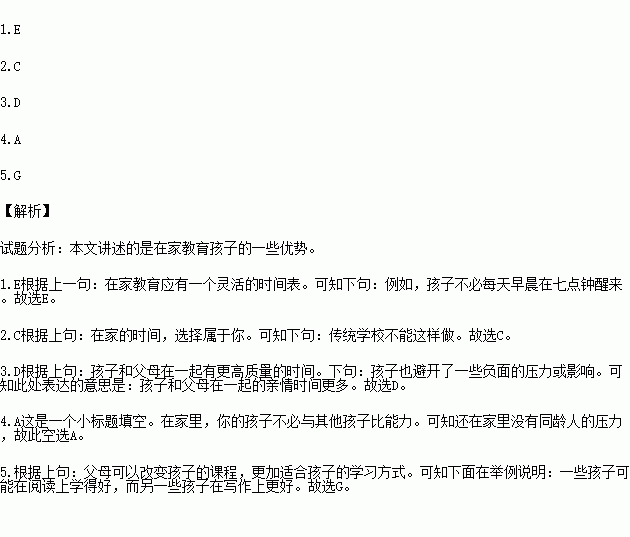题目内容
根据短文内容,从短文后的选项中选出能填入空白处的最佳选项。选项中有两项为多余选项。
Lately, there is a rising trend in families choosing to homeschool their child than send their child to a traditional educational institution. Let’s look at some of the benefits of homeschooling.
1. Flexible Schedule
Homeschooling enables a flexible schedule. 1. With homeschooling, your child can start homeschooling at 9 am or later depending on your preferred schedule. You can schedule your child’s homeschooling education as you see fit with materials or subjects that may be not available in a traditional school.
2. Individual Attention
With homeschooling, your child gets all the individual attention. For example, if your child is weak in maths, you could devote more time and energy to teaching maths. Your child’s homeschooling schedule can be adjusted for that. For example, if your child is better at science than at maths, simply devote more homeschooling hours to maths and cut back on science. With homeschooling, the choice is yours. 2.
3. Family Activity
The schooling of the child can become an extended family activity. Examples are field trips and experiments. Plus, the child also receives more quality time with his/her parents. 3. The child is also free of any negative peer pressure or influences.
4. 4.
With homeschooling, the child does not need to prove his/her abilities to other children. Parents are able to plan the learning program according to his strengths and weakness.
Parents can also change the curriculum to suit the learning style of the child. 5. Some children even learn better from experiencing or seeing things in action.
A. No peer pressure
B. Religion Learning
C. Traditional schools can’t do that.
D. There is more time for family bonding.
E. For example, the child needn’t wake up at 7 every morning.
F. Plus, it is quite impossible to provide individual attention to all students.
G. For example, some children learn better from reading while others need to write.

